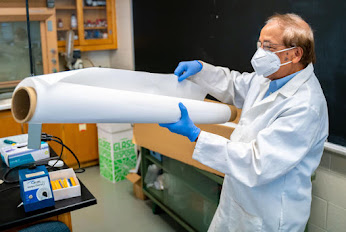UK researchers develop membrane that stops the Covid-19 virus

Dibakar Bhattacharyya and the membrane (UK photo by Ben Corwin)
—–
By Elizabeth Chapin
University of Kentucky
A team of researchers led by University of Kentucky College of Engineering Professor Dibakar Bhattacharyya and his Ph.D. student, Rollie Mills, have developed a medical face mask membrane that can capture and deactivate the Covid-19 spike protein on contact.
At the beginning of the Covid-19 pandemic in 2020, Bhattacharyya, known to friends and colleagues as “DB,” along with collaborators across disciplines at UK, received a grant from the National Science Foundation to create the material. Their research was published in the Nature journal Communications Materials on May 24.
The SARS-CoV-2 virus that causes Covid-19 is covered with spike proteins, through which it enters host cells in the body. The team developed a membrane that includes proteolytic enzymes that attach to the protein spikes and deactivates them.
“This new material can filter out the virus like the N95 mask does, but also includes antiviral enzymes that completely deactivate it. This innovation is another layer of protection against SARS-CoV-2 that can help prevent the virus from spreading,” said DB, the director of UK’s Center of Membrane Sciences. “It’s promising to the development new products that can protect against SARS-CoV-2 and a number of other human pathogenic viruses.”
DB’s team included J. Todd Hastings, Thomas Dziubla, and Kevin Baldridge, all Ph.D.s from the College of Engineering; Yinan Wei, a former professor in the Department of Chemistry; and Lou Hersh, of the Department of Molecular and Cellular Biochemistry. Mills, an NSF Graduate Fellow and first author of the article, and undergraduate students Ronald Vogler, Matthew Bernard and Jacob Concolino contributed extensively to the project.
The membrane was fabricated through an existing collaboration with a large-scale membrane manufacturer. It was then tested using SARS-CoV-2 spike proteins that were immobilized on synthetic particles. Not only could the material filter out coronavirus-sized aerosols, but it was also able to destroy the spike proteins within 30 seconds of contact.
The study reports that the membrane provided a protection factor above the Occupational Safety and Health Administration’s standard for N95 masks, meaning that it could filter at least 95% of airborne particles.
“These membranes have been proven to be a promising system of advancement toward the new generation of respiratory face masks and enclosed-environment filters that can significantly reduce coronavirus transmission by virus protein deactivation and enhanced aerosol particle capture,” the study reports.